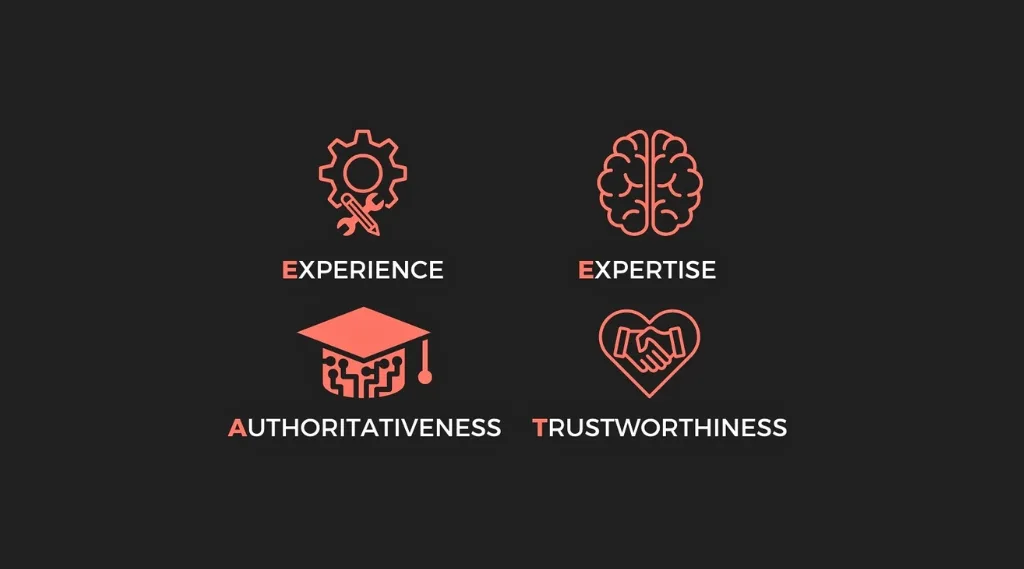The internet is drowning in content. Every day, blogs, social media posts, and video guides are being uploaded, all competing for attention. But Google isn’t easily impressed. If you want to improve your SEO, climb the rankings, and actually get clicks that count, you need to think about four key factors: Experience, Expertise, Authoritativeness, and Trustworthiness (EEAT). EEAT can be the difference between getting seen and getting ignored. If you’ve been focusing on your keywords and backlinks, but you’re still not hitting the top, then it’s time to shift your attention.
What is EEAT and Why Should You Care?
EEAT is one of – if not the – top ways that Google assesses the quality and credibility of content. Suppose your web presence lacks these key factors; you’re both missing out and potentially actively harming your domain authority.
Let’s break it down.
- Experience: Do you (or your authors) have a deep, clear understanding of the topic you’re covering?
- Expertise: Are you qualified to talk about it? This could be professionally or personally.
- Authoritativeness: Do others in your industry – and your consumer base – see you as a reliable source?
- Trustworthiness: Can people (and Google) trust your content?
If your site doesn’t tick these boxes, your rankings will stagnate and slide. Google’s algorithms are ruthless when it comes to credibility, and the days of tricking your way to the top are (thankfully) long gone.
These Days, You’ve Got to Know Your Stuff
Google wants to serve its users reliable, useful content. That’s why it prioritises websites that signal a strong commitment to EEAT. If two sites cover the same topic, but one is backed by a recognised expert while the other is generic and without credentials, guess which one ranks higher.
This is especially important if you’re over-reliant on AI-generated content, too. Google can spot this a mile off, and – if it’s not checked, sourced, edited, and optimised – it’s not going to rank well. AI can be a great helping hand for brainstorming and drafting, but if left unchecked, it’s likely to produce bland, generic, and poorly backed-up content.

How Does EEAT Impact Domain Authority?
Your domain authority is a measure of how well your site is likely to rank in search engines. While it’s not a direct Google ranking factor, a high domain authority usually means better visibility. EEAT plays a big role in building it, too.
- Quality content: Google likes in-depth, well-researched content that offers genuine value.
- Credible backlinks: If authoritative sites link to you, it signals to Google that you’re a trusted source.
- User trust signals: Good reviews, secure site connections (HTTPS), and a professional site structure all reinforce your domain authority.
How to Improve EEAT and Climb the Rankings
Show off your expertise.
If your website lacks author information, credibility takes a hit. Every piece of content should be linked to a real person with relevant expertise. Add author bios or Meet the Team pages that highlight credentials, experience, and industry recognition, and make sure you reference recognised sources and industry leaders to reinforce authority.
Build your topical authority.
Google loves websites that dominate a niche. If you only scratch the surface of a topic, you won’t stand out. So go beyond the basics – add data, insights, interviews, and unique perspectives. You also need to keep the content fresh and updated to be sure that it’s relevant and authoritative.
Strengthen your site’s trustworthiness.
Would you buy from a dodgy-looking site? Didn’t think so. And, if you won’t, then neither will your customers. Web design and user experience are key here as they give a sense of quality and authority when done right. Make sure your site uses HTTPS for secure connections and displays trust indicators like testimonials and reviews. It’s also important to be transparent about your business, so a clear About Us page is a must.
Make your content readable.
Google rewards content that people actually read and engage with. If visitors bounce because your content is a chore to get through, your ranking will drop. Keep paragraphs short and easy to scan, break up info with bullet points, and use natural, conversational language. A good tip is to write how you’d speak.
Stay active and relevant.
An outdated site shows users and Google that you’re not reliable. Stay active to keep your authority by regularly updating old content and staying on top of trends in your industry. Blogging and content creation are great for this as they ensure a steady flow of new, interesting information.
Improve Your SEO with an Agency That Understands EEAT
EEAT isn’t another box to tick – it’s the foundation of long-term SEO success. At One2create, we can help you build a credible, high-ranking website that Google – and your audience – trust. From expert-led content creation and copywriting to strategic SEO improvements, we make sure that you’re squeezing every drop of potential from your online presence. Want to see how we can help you to improve your SEO and boost your domain authority? Get in touch with us today.
FAQs
How long does it take to see results from EEAT improvements?
Improving your SEO is a marathon, not a sprint. You might see minor improvements in a few months, but big rankings boosts can take six months to a year, depending on competition and industry factors.
Can a new website compete with established brands in EEAT?
Yes – you just need to be smart about it. Focus on building topical authority, earning quality backlinks, and demonstrating real expertise in your niche. If you provide a localised product or service, local SEO is also a good way to fight on your own terms.
Do all businesses need to worry about EEAT?
If you rely on Google traffic, being conscious of EEAT is pretty vital. It’s especially important for industries where credibility and trust matter the most, like education, business services, and fire & safety.
Does social media impact EEAT?
Not directly, no. But it can help a lot. A strong social media presence increases your brand visibility and can lead to more shares, mentions, and backlinks. In general, appearing across different channels is a good thing.







